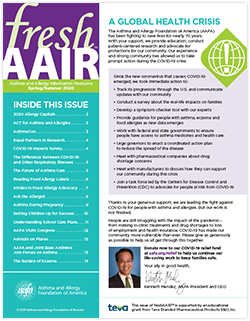Even though 32 million Americans have food allergies, protections for people with food allergies are still lacking. The Asthma and Allergy Foundation of America (AAFA) and its division Kids With Food Allergies (KFA) have been advocating for better food allergy awareness and for ways to prevent severe allergic reactions.
Engagement With FDA During COVID-19 – AAFA is leading a coalition of 13 other food allergy organizations to respond to the Food and Drug Administration's (FDA) "Temporary Policy Regarding Certain Food Labeling Requirements During the COVID-19 Public Health Emergency." AAFA has met with the FDA several times to clarify that manufacturers must label all substitutions that pose a safety concern, which includes the top 8 major allergens as well as sesame, celery, lupin, buckwheat, molluscan shellfish, mustard, glutamates and sulfites. AAFA continues to work with the FDA, food allergy organizations and food industry groups to ensure food safety and security for our community during this unprecedented time. On June 18, 2020, the FDA responded with a list of FAQs to clear up confusion around the labeling guidelines.
Food Allergy Collaborative – AAFA and KFA have recently partnered with the following patient advocacy organizations to fight for protections for people with food allergies:
- Allergy & Asthma Network
- AllergyStrong
- Elijah-Alavi Foundation
- End Allergies Together
- Food Allergy & Anaphylaxis Connection Team (FAACT)
- Food Allergy Fund
- Food Allergy Research & Education (FARE)
- Food Equality Initiative
Sesame Labeling – Sesame is the ninth most common food allergen. Yet, the FDA does not require it to be included on food labels. This leads to a large number of allergic reactions – many of them severe – that could be avoided. AAFA began asking the FDA to require sesame labeling in 2014. We were pleased that the FDA recognized sesame as a safety concern for the first time in their temporary guidance and AAFA will continue to petition the FDA until sesame labeling is permanently required.
Food Allergy Safety, Treatment, Education, and Research (FASTER) Act – This law would require the Centers for Disease Control and Prevention (CDC) to improve how they track the amount of specific food allergies in the U.S. It would also include sesame as a major allergen. And the National Institutes of Health (NIH) would study the economic costs of food allergies in the U.S.
In March, the FASTER Act was passed through the House Health Subcommittee and is now awaiting mark up by the full House Energy & Commerce Committee. Senators Scott (R-SC), Murphy (D-CT), Collins (R-ME) and King (I-ME) also introduced a similar bill in the Senate, the FASTER Act of 2020.
Elijah’s Law – Elijah’s Law is named after Elijah Silvera, who passed from anaphylaxis at a day care in New York. The facility did not follow emergency procedures. Under this law, New York child day care programs have to follow guidelines for preventing and responding to severe food allergy reactions. AAFA is supporting the Elijah-Alavi Foundation in their efforts to see this law passed throughout the entire U.S.
Join our online community and follow our blog to find out how you can join us in food allergy advocacy.
 Sign up for our FREE asthma and allergy magazine – freshAAIR™! Get our latest issue full of information on ways you can manage food allergies, asthma and other allergic conditions.
Sign up for our FREE asthma and allergy magazine – freshAAIR™! Get our latest issue full of information on ways you can manage food allergies, asthma and other allergic conditions.Read online or have it delivered to your inbox.

Comments (0)